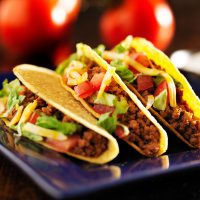There’s Meat in that Marketing Taco

Taco Bell ad pros at DraftFCB have always been known for their creativity. But will the agency’s most recent idea, a completely immersive Taco Bell experience, give the company the boost it needs to appease concerns over its financial future?
In 2011, Taco Bell was sued by Amanda Obney, a customer in California who argued that Taco Bell could not call its filling “seasoned beef” because it contained too little beef to be considered meat. The company immediately countered with its filling recipe: 88 percent beef and 12 percent “signature recipe,*” plus $4 million in counter-advertising, including full-page nationwide ads, television commercials, and online media.
The lawsuit was eventually dropped but the damage was done, as Taco Bell’s same-store sales dropped by 2 percent that year, prompting their franchisee council to demand an agency review regarding the fallout from the false-advertising claim and its “value messaging.” The eventual result emerged in February 2012, when Taco Bell changed its slogan from “Run for the Border” to “Live Más” (Live More).
According to a Taco Bell spokesman, the change in slogan signified a more customer- and employee-focused business and a “commitment to value, quality, relevance and an exceptional experience.” Parent company Yum Brands spent nearly $250 million on domestic media as part of the rebranding campaign, including millennial-targeted branding, product launches and menu extensions, and partnerships.
Last year Taco Bell jumped into the passenger seat with Lyft, giving passengers the ability to pay for their meals with the Lyft app, a move dubbed “Taco Mode” by Lyft’s head of marketing, Melissa Waters,, who told The New York Times that this partnership differed from the typical food delivery service in that it “extends your night out by getting the food with your BFFs.” In October, Taco Bell joined forces with Forever 21 to release men’s, women’s and children’s clothing featuring Taco Bell-themed graphics, the iconic logo, and even a full bodysuit designed to make the wearer look like a hot sauce packet.
Taco Bell is going a step further, giving customers the opportunity to experience its food as a lifestyle as opposed to a fleeting lunch break spot. Want to get married at a Taco Bell? You can do that in Las Vegas for a mere $600. Taco Bell marketers explained “cookie-cutter weddings are a thing of the past for millennials, who are putting new, personal spins on old traditions. For couples who love Taco Bell, and each other, tying the knot at Taco Bell is a unique way to spend their big day.”
This year, Taco Bell announced they will open a temporary (“pop-up”) resort in Palm Springs
in August giving “superfans” an all-inclusive Taco Bell experience
complete with exclusive menu options, tacos hand delivered by “Bell”
hops, poolside Mountain Dew Baja Blast cocktails, a taco-inspired nail
salon and hairdresser, and a gift-shop. Yum!’s 2018 annual report to investors reported Taco Bell’s same-stores sales growth was 4 percent, marking the brand’s 7th
consecutive year of positive same-store sales growth. Yum! attributed
this rising trend to partnership and innovation, both of which appear to
be working in their favor. It’s hard to believe that this
groundbreaking outside the bun box branding came from a fraudulent lawsuit.
*water, cellulose, chili pepper, maltodextrin, salt, oats, soy lecithin, spices, tomato powder, sugar, onion powder, citric acid, natural flavors including smoke flavor, torula yeast, cocoa, disodium inosinate and guanylate, dextrose, lactic acid, modified corn starch, salt, sodium phosphates
